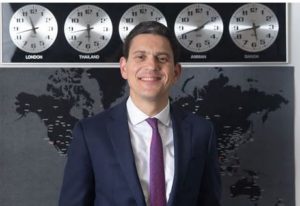Refugees are humanity’s moral test – Milliband
 The world refugee crisis is the moral “test of our times” and is critical but not overwhelming, according to David Miliband, CEO of the US-based global aid organisation International Rescue Committee.
The world refugee crisis is the moral “test of our times” and is critical but not overwhelming, according to David Miliband, CEO of the US-based global aid organisation International Rescue Committee.
Mr Milliband, a former British Foreign Secretary and the son of refugees, has written a book based on his four-year tenure with the organisation titled ‘Rescue: Refugees and the Political Crisis of Our Time’.
The book travels from war zones in the Middle East to peaceful suburbs in America attempting to explain the crisis that has seen 65 million people around the globe flee their homes.
It also tries to show what can be done, not just by governments with the power to change policy but by citizens with the urge to change lives.
In his book, Mr Miliband says the western world is engaged in a fight to uphold the best of human nature in the face of rhetoric and policy that value the worst of it.
He defends the international order built by Western leaders out of the ashes of World War II, but says now is the time for reform arguing that if we fail refugees, then we betray our own history, values, and interests.
Mr Milliband says his life as profoundly influenced by his parents’ experiences as refugees fleeing the Nazis and he deals with that in the book.
“My dad was a refugee from Belgium to the UK in 1940, my mum a refugee from Poland in 1946,” he said.
“And when I came to write the book, I struggled with the first line. But in the end it wrote itself: ‘The first refugees I met were my parents’.
“And I think they gave me security in a way that many refugees who value the freedom and the security that their children have and that they never had themselves. And that helped me bring some passion, as well as some policy detail to the book,” Mr Milliband said.
He said the reasons behind his parents flight were remarkable similar to why people are fleeing today.
“Obviously, global politics is mercifully different. And the religion of most of those fleeing is different, too. But civil wars, persecution and oppression are driving the extraordinary numbers of people,” Mr Milliband said.
“One in every 110 people on the planet forcibly displaced from their homes,” he said.
The book leverages several salient statistics. One reveals that the average duration of displacement for a refugee is 10 years, and once someone has been outside their own country for five years, that figure rises to 21 years.
“This situation demands a complete change in the humanitarian system,” Mr Milliband said.
“We have to recalibrate our vision: aid in the 21st century is about helping people to thrive as well as survive. This means providing education and employment, as well as food aid,” he said.
Mr Milliband said the crisis was not just about human suffering but also about a cynical view that this is a problem that is unfixable.
“There a sense that we’re going to have to live with this crisis. But the argument of my book is that we can’t afford to do that morally,” he said.
“But we also can’t afford to do that strategically because a humanitarian crisis is the product of political crisis and it also is the cause of further political instability.
“And you only have to look at the Middle East today and its consequences way beyond there into Europe to see the danger,” he said.
The book points out that the top ten refugee hosting countries are places like Lebanon, Jordan, Turkey, Kenya, Ethiopia, Uganda, Bangladesh.
It says that these countries account for only two and a half percent of global income.
“So the challenge for the richer parts of the world I think is twofold. First of all, to engineer, to lead an international humanitarian aid system that really does meet the challenge of the times that gets refugees into employment and that gets kids – half of the world’s refugees are kids – into education,” Mr Milliband said.
“And, tragically, at the moment, less than two percent of the world’s humanitarian budget is spent on education,” he said.
“The second half of the challenge is to stand with those countries who are hosting refugees, stand with them substantively but also symbolically by welcoming refugees to our own shores.
“And it is tragic that after 50 or 60 years in which the United States has led the world in refugee resettlement, hosting an average of about 90,000 refugees a year into this country – people who’ve then gone on to make extraordinary contributions to this country – that the US administration should now be slashing the number of refugees who are allowed into the US,” Mr Milliband said.
The book also argues for the need for political solutions to the conflicts that have caused the refugee crisis.
“Trying to get upstream and to do the peace making the peace building the peace keeping that is absolutely essential. And, of course, the humanitarian effort is dealing with the symptoms of the refugee crisis,” Mr Milliband said.
“I often say to people that the job of the humanitarian sector is to staunch the dying, but it takes politics to stop the killing,” he said.
Laurie Nowell
AMES Australia Senior Journalist












